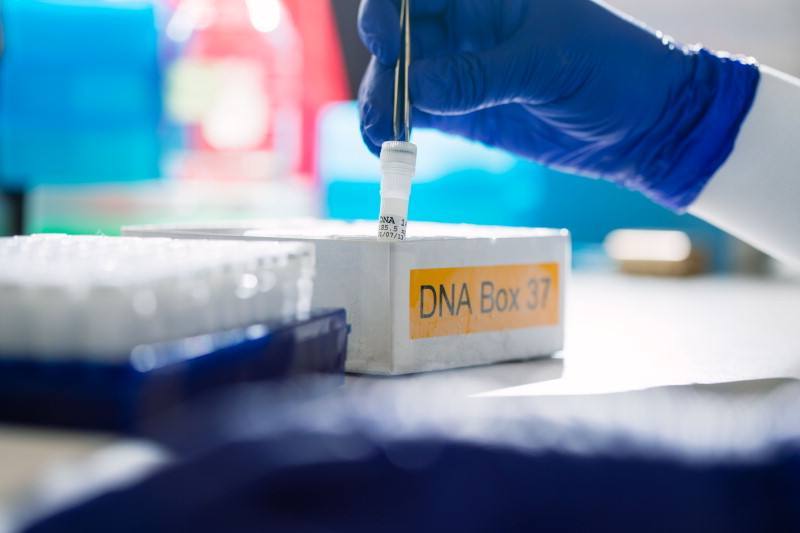-
Mayo Clinic discovers biological markers that could guide treatment for prostate cancer

ROCHESTER, Minn. — Genetic alterations in low-risk prostate cancer diagnosed by needle biopsy can identify men that harbor higher-risk cancer in their prostate glands, Mayo Clinic has discovered. The research, which is published in the January edition of Mayo Clinic Proceedings, found for the first time that genetic alterations associated with intermediate- and high-risk prostate cancer also may be present in some cases of low-risk prostate cancers.
The study found the needle biopsy procedure may miss higher-risk cancer that increases the risk of disease progression. Researchers say that men diagnosed with low-risk cancer may benefit from additional testing for these chromosomal alterations.
“We have discovered new molecular markers that can help guide men in their decisions about the course of their prostate cancer care,” says George Vasmatzis, Ph.D., co-director of the Center for Individualized Medicine Biomarker Discovery Program and lead author on the study. “Overtreatment has been issue for the group of men that our study targets. We found that the presence of genetic alterations in low-risk cancer can help men decide whether treatment or active surveillance is right for them.”
Prostate cancer is assessed by Gleason patterns and score that indicate grade. The Gleason patterns are strongly associated with risk of disease progression. Gleason pattern 3 prostate cancer is considered to be low-risk. Gleason patterns 4 and 5 cancer carry a higher risk of aggressive behavior.
Men whose tumor is composed entirely of Gleason pattern 3 may choose active surveillance. They are monitored closely with blood tests and needle biopsies, as necessary. Or they may be referred to treatment, such as surgery and radiation, particularly if they have Gleason pattern 4 or 5.
Men with a low-risk cancer sometimes choose surgery because they don’t want to risk disease progression. The study found that men who do not have these alterations in their cancers have a low risk of harboring aggressive disease. These men may feel more comfortable choosing active surveillance. Alternatively, if a man’s low-risk tumor shows these alterations, they have a higher risk that their cancer may progress. They may consider treatment, including surgery.
The research
Researchers performed DNA sequencing with a high-tech genomic tool known as mate-pair sequencing. This research was performed on specific Gleason patterns from frozen cancer specimens from 126 men who had their prostate glands removed. They found five genes are more frequently altered in Gleason patterns 4 and 5. These alterations were found more commonly in Gleason pattern 3 associated with higher Gleason patterns and not when Gleason pattern 3 was found alone.
“The needle biopsy procedure samples only a small portion of the tumor. It is not uncommon that a man with a Gleason pattern 3 on needle biopsy specimen harbors a higher-grade cancer next to the pattern 3 that was missed by the procedure,” says John Cheville, M.D., co-director of the Center for Individualized Medicine Biomarker Discovery Program and co-author of the study. “Therefore, if we identify these alterations in a Gleason pattern 3, there is a higher likelihood that Gleason pattern 4 is nearby.”
Researchers took the genetic information generated using mate pair sequencing and converted it into a test called "fluorescence in situ hybridization" (FISH) that validated the genetic alterations in clinical samples. The FISH test is available for Mayo patients.
###
About Mayo Clinic Center for Individualized Medicine
Mayo Clinic Center for Individualized Medicine discovers, translates and applies new findings in genomic research into individualized medicine products and services for patients everywhere. Learn more on the Mayo Clinic Center for Individualized Medicine website.
About Mayo Clinic Proceedings
Mayo Clinic Proceedings is a monthly peer-reviewed medical journal that publishes original articles and reviews dealing with clinical and laboratory medicine, clinical research, basic science research and clinical epidemiology. Mayo Clinic Proceedings is sponsored by the Mayo Foundation for Medical Education and Research as part of its commitment to physician education. It publishes submissions from authors worldwide. The journal has been published for more than 80 years and has a circulation of 130,000. Articles are online at mayoclinicproceedings.org.
About Mayo Clinic
Mayo Clinic is a nonprofit organization committed to clinical practice, education and research, providing expert, comprehensive care to everyone who needs healing. Learn more about Mayo Clinic. Visit the Mayo Clinic News Network.
Media Contact:
- Susan Buckles, Mayo Clinic Public Affairs, 507-284-5005, newsbureau@mayo.edu







